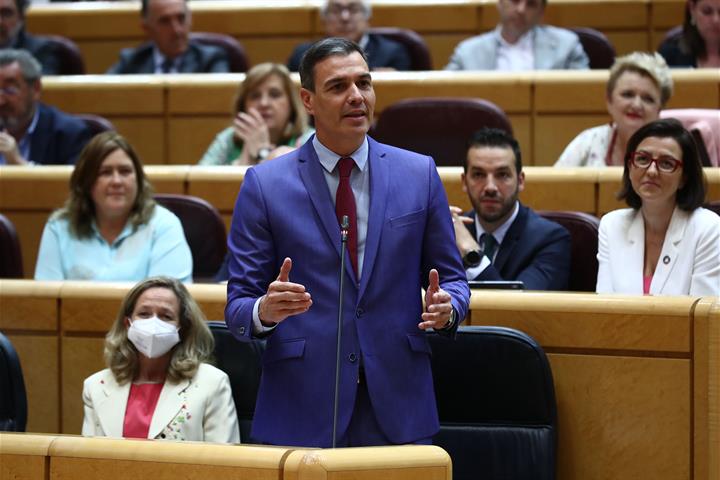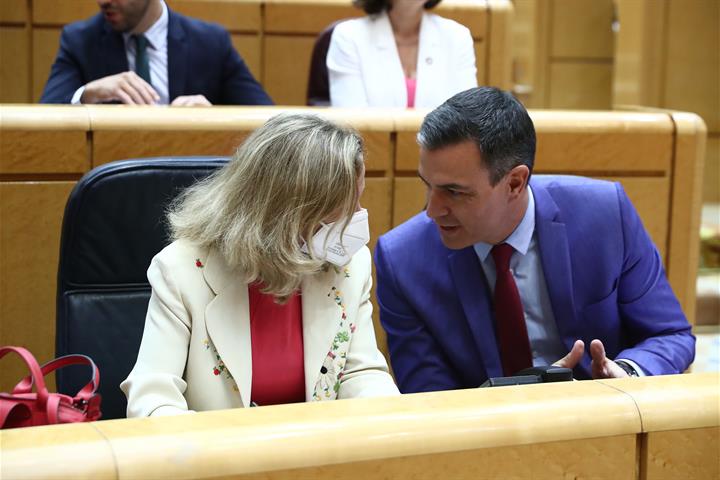Government control session in the Upper House of Parliament
Sánchez: "The Government of Spain is working tirelessly to protect families and businesses"
President's News - 2022.6.7
Upper House of Parliament, Madrid
 Foto: Pool Moncloa/Fernando Calvo
Foto: Pool Moncloa/Fernando Calvo
During his speech at the government control session held in the Upper House of Parliament, the Chief Executive defended his response to the economic, social and health challenges posed by the COVID-19 pandemic and Russia's aggression against Ukraine.
Pedro Sánchez stated that the government has always protected families and companies through various instruments, including the lines of guarantees managed by the Official Credit Institute (ICO), the Temporary Redundancy Provisions (ERTES), direct benefits for the self-employed, the so-called social shield, the Minimum Basic Income and European funds.
The president was responding to Alberto Núñez Feijoo, member of the PP parliamentary group, who was questioning Sánchez on his management of the needs of the Spanish people: "The government has been working tirelessly to protect families and businesses".
Sánchez assured him that the spirit of the government is to work to reach the maximum degree of consensus. In this respect, he recalled that 20 Conferences of Presidents have been held during this legislature and 14 agreements have been reached with the social partners on issues as important for citizens as the labour reform, which is increasing permanent employment, and the revaluation of pensions in accordance with the Consumer Price Index.
The president also stressed that when his party was in opposition it supported and signed state pacts against terrorism and gender violence of universal benefit
In the Upper House, Pedro Sánchez also recalled that he has offered Núñez Feijóo 11 agreement, including the reform of article 49 of the Constitution to eliminate the word 'handicapped' from the text, to speak well of Spain abroad, to accelerate the ecological transition and to provide an economic and social response to the consequences of the war.
In relation to this issue, the president explained that the government is currently in dialogue with the affected sectors to reach an agreement and grant direct aid for transport and the primary sector. The protection of vulnerable families by means of initiatives such as the Social Electricity Voucher, which reaches two million people, and the reduction in electricity bills are also the focus of the government's action.
The president concluded his speech by posing the question: "Social rights or social regression?", to which he responded by underlining his commitment to the former.
Social and labour agenda and public investments
 Foto: Pool Moncloa/Fernando Calvo
Foto: Pool Moncloa/Fernando Calvo
Pedro Sánchez reaffirmed, before Senator Mirella Cortès of the Esquerra Republicana parliamentary group, his government's "unequivocal, firm and resounding" commitment to the social and employment agenda, stating as examples the Minimum Basic Income, "which is protecting more than 400,000 families", and the increase in the Minimum Interprofessional Wage to 1,000 euros, in accordance with the European Social Charter recommendations.
Sánchez also assured that the objectives set for investment and execution in infrastructures are being met, despite the global difficulties that the pandemic, the economic crisis and the problems of supply of materials have caused in the last two years.
The president explained that the situation will improve in 2022, and that in fact, already in this first quarter, 61% more has been executed in Catalonia than in the previous year in important projects such as Barcelona airport, La Sagrera station and the burying of the railway line in Montcada i Reixac, among others.
Sánchez assured that in the first General State Budget approved, his government complied with the public investment mandated by the Statute of Autonomy of Catalonia, and that since then investments worth more than 40 billion euros have been executed, "23% more than in the same period of the term of office of the previous government".
Sánchez also recalled that two monitoring committees have been set up, one on infrastructures and the other on investments. The latter could be set in motion, he said, "when ERC designates its representative".
Last, the President defended the fact that throughout his term of office, "the total lack of communication between the governments of Spain and Catalonia" has been resolved, reaffirming his "total and resounding commitment to coexistence and to promoting an agenda of reunion".
Implementation of the law on victims of terrorism
Last, the president responded to the question raised by Senator Estefanía Beltrán de Heredia of the Basque parliamentary group, regarding the denials of recognition and compensation to victims of terrorism of the Anti-Terrorist Liberation Group (GAL), the Spanish Basque Battalion (BVE) and extreme right-wing groups who have not been judicially convicted of involvement in serious crimes.
Sánchez explained that those affected filed a legal claim against the rejection of their application by the Directorate General for Support to Victims of Terrorism of the Ministry of Home Affairs, and that the courts confirmed the rejection by the ministry, ordering the claimants to pay the costs.
"The government believes that the rejection of the aid applications is in accordance with the law and has been confirmed by both the National Court of Spain and the European Court of Human Rights," he continued.
Sánchez recalled that administrative acts that have become final through judicial appeals cannot be reviewed.
Non official translation




